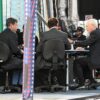Have you ever looked closely at the small bottles of “Fireball” being sold at your local gas station or liquor store? Anna Marquez did one day, and now she’s suing the cinnamon whisky’s parent company for being misled.
NBC writes, If you’ve ever been confused by miniature bottles branded as Fireball Cinnamon, the popular cinnamon-flavored drink found in gas stations and supermarkets, you’re not alone — and now there’s a lawsuit over the matter.
Citing two news articles pointing out that the bottles, while displaying the Fireball label, do not actually contain whisky, lawyers representing Chicago plaintiff Anna Marquez are seeking unspecified damages against Fireball-maker the Sazerac Company.
In the suit, Marquez and her attorneys say the mini bottles, which advertise “Fireball Cinnamon,” falsely give consumers the impression that the drinks are merely smaller versions of regular Fireball whisky. The fine print on the bottles, which states that the shots are a “malt beverage with natural whisky & other flavors and caramel color,” is deceptive because it includes the word “whisky,” they wrote.
“When viewed together with the Fireball distilled spirit brand name, the label misleads consumers into believing it is or contains distilled spirits,” the suit states.
Forbes shared some of the main points from the lawsuit. Marquez alleges:
- Despite ‘almost identical’ labels, Fireball sold at non-liquor stores ‘is not whisky at all.’
- The Plaintiff “did not immediately notice the differences” between Fireball Cinnamon and real whiskey due to the “labeling elements.”
- Expecting a beverage branded “Fireball Cinnamon” to contain whiskey “is an easy mistake to make, and one intended by the manufacturer.”
- Liquor stores reported fewer Fireball Cinnamon Whisky sales after customers found cheaper prices elsewhere.
- As a result of the company’s branding, the Plaintiff paid “more…than she would have” if she’d known the product didn’t contain whiskey.
Marquez also argues that government regulations permit Fireball to use its spirit brand name, they prohibit ‘the overall misleading impression’ of the smaller bottle’s packaging.”
“The smaller bottles, named Fireball Cinnamon, are made from a blend of malt beverage and wine, while the whiskey-based products are called Fireball Cinnamon Whisky,” writes NPR.
“The 99-cent bottles are sold in 170,000 stores, including gas stations and grocery stores, prompting some customers to wonder what products they presumed to contain liquor were doing there, the complaint says.
“What the label means to say is that the product contains ‘natural whisky flavors & other flavors,’ but by not including the word ‘flavors’ after ‘natural whisky,’ purchasers who look closely will expect the distilled spirit of whisky was added as a separate ingredient,” the complaint says.
The lawsuit further states that given the lack of whiskey, 99 cents for a 1.7 fluid ounce bottle is overpriced.”
The New York Times added, “The lawyer who filed the lawsuit, Spencer Sheehan, has filed more than 400 lawsuits targeting food and beverage companies, NPR reported in 2021. Many of these lawsuits accuse companies of misleading product labeling, such as foods described as vanilla-flavored, but that actually use synthetic vanilla instead of vanilla beans or vanilla extract.
Mr. Sheehan is seeking class action status for the lawsuit to cover people who bought Fireball Cinnamon in 12 states, including Illinois, Wyoming and Arizona.”
Fireball originally started as part of a schnapps line created by Seagram’s in the 1980s. The company made up a story behind the whisky’s origins claiming “it was the product of a Canadian bartender’s efforts to warm up from an Arctic blast.” In 1989, The Sazerac Company purchased the brand rights and formula.
The flavored whisky became huge during the 2010s. CNN Money called the drink “the fastest-growing big brand of liquor in America. Retail sales more than doubled last year, and Fireball has come seemingly out of nowhere to become the sixth-most popular liquor brand in the U.S. as measured by retail sales – ahead of such venerable labels as Jim Beam, Jose Cuervo and Grey Goose.”
[Read More: How Apple Is Beating The Competition…Again]



